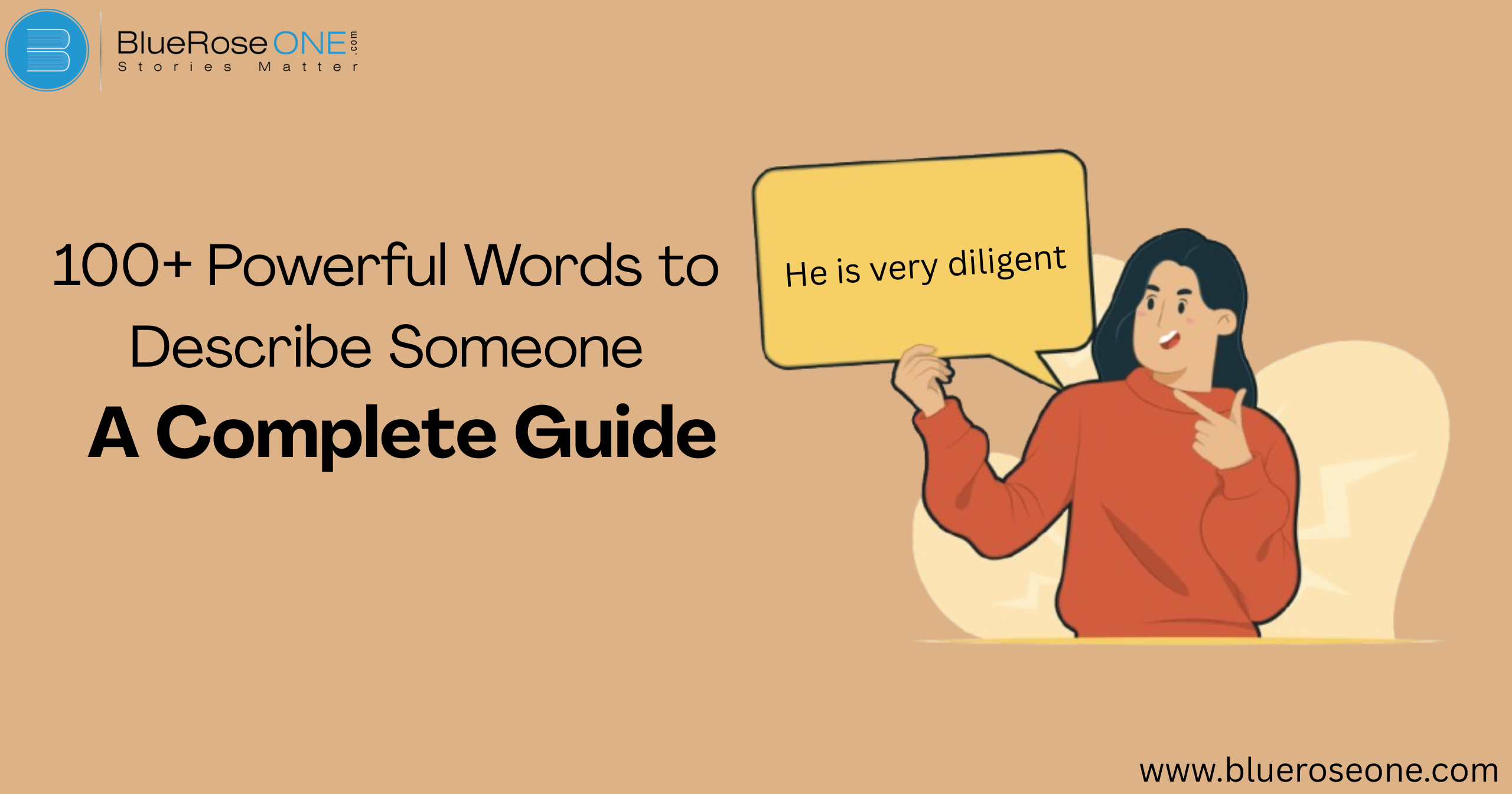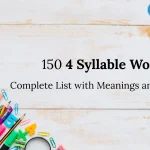Have you ever struggled to find the proper term to describe someone? Whether you’re writing a story, updating your resume, penning a love letter, or just trying to compliment a friend words matter. The way you describe someone can shape how others see them (and how they see themselves).
Let’s dive into over 100 powerful, carefully chosen words that’ll help you describe someone effectively, respectfully, and impactfully.
Descriptive Words by Personality Type

Words for Positive Personalities
Let’s start on a high note. Here are a few gems to describe someone with a great personality:
- Compassionate – They feel deeply and care for others.
- Ambitious – They strive for greatness and set high goals.
- Loyal – They stick with you through thick and thin.
- Generous – Always ready to give, expecting nothing in return.
- Reliable – You can count on them no matter what.
Words for Negative Personalities
It’s okay to call out traits that aren’t so endearing—especially if you’re writing fiction or describing a character:
- Arrogant – They think they’re better than everyone else.
- Stubborn – Changing their mind? Good luck.
- Deceitful – Lies come too easily.
- Moody – You never know what version of them you’ll get.
- Judgmental – Quick to criticize others.
Neutral Traits (Depends on Context)
These can be good or bad depending on the situation:
- Reserved – Quiet and keeps to themselves.
- Outspoken – Doesn’t hold back opinions.
- Serious – Focused, perhaps too much.
- Bold – Takes risks, sometimes to a fault.
You may also like: Top 15 Mood Examples in Literature & How They Shape Stories
Describing Someone’s Intelligence

Positive Intellectual Traits
Smart people come in all shapes and styles:
- Insightful – They get the deeper meaning.
- Quick-witted – Always ready with a clever comeback.
- Analytical – Loves digging into details.
- Visionary – Sees the future before anyone else.
Negative or Flawed Intelligence Traits
Sometimes smart isn’t always smooth:
- Know-it-all – Acts like an expert on everything.
- Overthinking – Can’t let anything go.
- Absent-minded – Brilliant but forgets everything.
You may also read: 100+ Character Traits Examples for Writers and Students
Words to Describe Physical Appearance

General Physical Descriptors
Want to paint a picture?
- Elegant – Graceful and classy.
- Rugged – Tough-looking and masculine.
- Petite – Small and delicate.
- Athletic – Fit and energetic.
Descriptors by Facial Features
Let’s zoom in:
- Bright-eyed – Looks curious and lively.
- Chiseled – Sharp, well-defined features.
- Radiant – Glowing skin and vibrant aura.
- Wrinkled – Signs of wisdom and experience.
Words to Describe Someone’s Work Ethic

Professional and Dedicated
Perfect for resumes and recommendations:
- Diligent – Always puts in the effort.
- Driven – Motivated and self-starting.
- Dependable – Always comes through.
Lazy or Unreliable Traits
When things don’t get done:
- Procrastinator – Always leaves things to the last minute.
- Sluggish – Moves slow and lacks energy.
- Careless – Misses important details.
You may aslo like: Top 10 Must-Read Aadvika Pommu Novels (ஆத்விகா பொம்மு)
Describing Social Behavior

Outgoing and Social
Great for social butterflies:
- Charismatic – Magnetic and charming.
- Gregarious – Loves being around people.
- Warm – Makes you feel welcome.
Introverted and Reflective
Perfect for deep thinkers:
- Quiet – Speaks little, thinks a lot.
- Thoughtful – Always considers others.
- Mysterious – Hard to figure out, intriguing.
You may also like: Diva Secret Cellular Nutrition Therapy by Dr. Wandoh Timothee Djimet: Book Summary
Words to Describe Someone’s Morality and Integrity
- Honest – Truth-teller through and through.
- Ethical – Strong sense of right and wrong.
- Noble – Acts with honor.
- Corrupt – Morally compromised or shady.
Words by Relationship Role

Romantic Partners
- Passionate – Brings fire to the relationship.
- Supportive – Always has your back.
- Protective – Will keep you safe at any cost.
Friends
- Loyal – The ride-or-die kind.
- Funny – Always good for a laugh.
- Honest – Tell the truth, even when it’s hard
Leaders
- Authoritative – Commands respect.
- Visionary – Has big ideas.
- Respectful – Values others’ input.
You may also read: Pacing Definition in Literature: Guide for Writers and Readers
Cultural and Emotional Descriptors

- Traditional – Values customs and rituals.
- Open-minded – Welcomes new ideas.
- Empathetic – Feels others’ emotions.
- Temperamental – Emotional and unpredictable.
100+ Powerful Words to Describe Someone (Full List)
Positive Traits:
Adventurous, Ambitious, Bright, Calm, Capable, Cheerful, Confident, Creative, Dependable, Energetic, Generous, Gracious, Hardworking, Humble, Idealistic, Independent, Kind, Loving, Mature, Optimistic, Organized, Patient, Polite, Reliable, Respectful, Sincere, Smart, Strong, Talented, Thoughtful, Trustworthy, Witty
Negative Traits:
Neutral/Contextual Traits:
Tips for Using These Words Effectively
- Think about the context – A “quiet” person at work might be “focused” rather than “shy.”
- Mix in action – Show how the person behaves to support your description.
- Don’t overdo it – One powerful word is better than three vague ones.
- Use the right tone – Formal for job writing, casual for personal notes.
You may also read: What is a Title Page? Definition, Purpose and Examples
When to Avoid Describing Someone with Words
- In emotionally sensitive situations – Choose empathy over labels.
- When words fall short – Sometimes, actions speak volumes.
Real-Life Examples of Descriptions
- In job letters: “Emma is a meticulous and dependable team member who consistently delivers results.”
- In dating bios: “I’m a goofy, passionate, and loyal guy looking for a partner in crime.”
- In stories: “He was a stoic man with a chiseled jaw and piercing blue eyes.”
Final Thoughts
Words are powerful. The right description can uplift, inspire, or even heal. So whether you’re praising someone, writing fiction, or just putting your thoughts into words—choose wisely, speak kindly, and describe with purpose.
Frequently Asked Questions
Compassionate or empathetic are excellent choices.
Not really. People are complex, so it’s often better to combine a few traits.
Yes—especially ones like diligent, reliable, and driven.
Use neutral words like difficult, reserved, or opinionated depending on the context.
Honest or truthful are strong picks.















